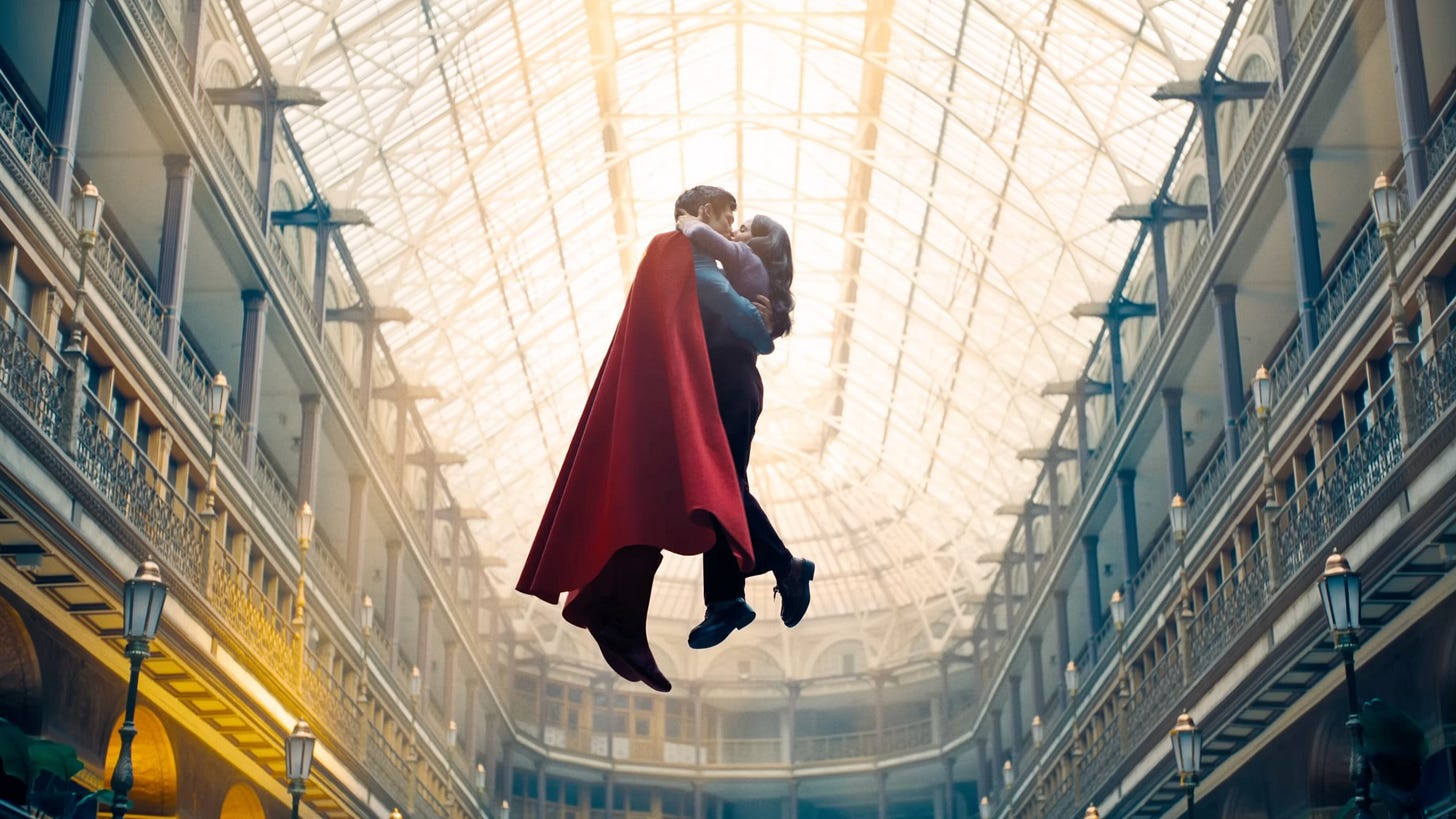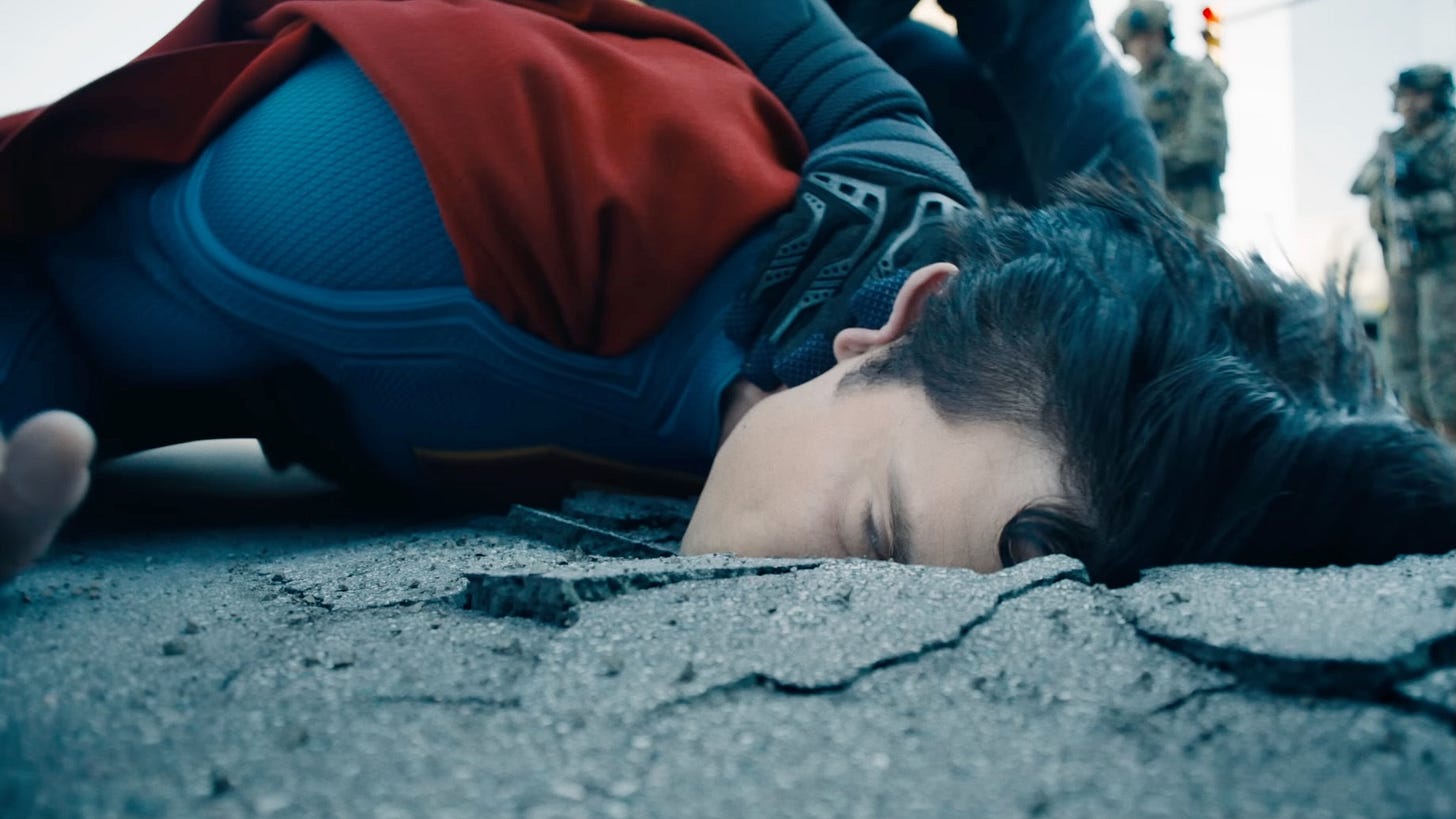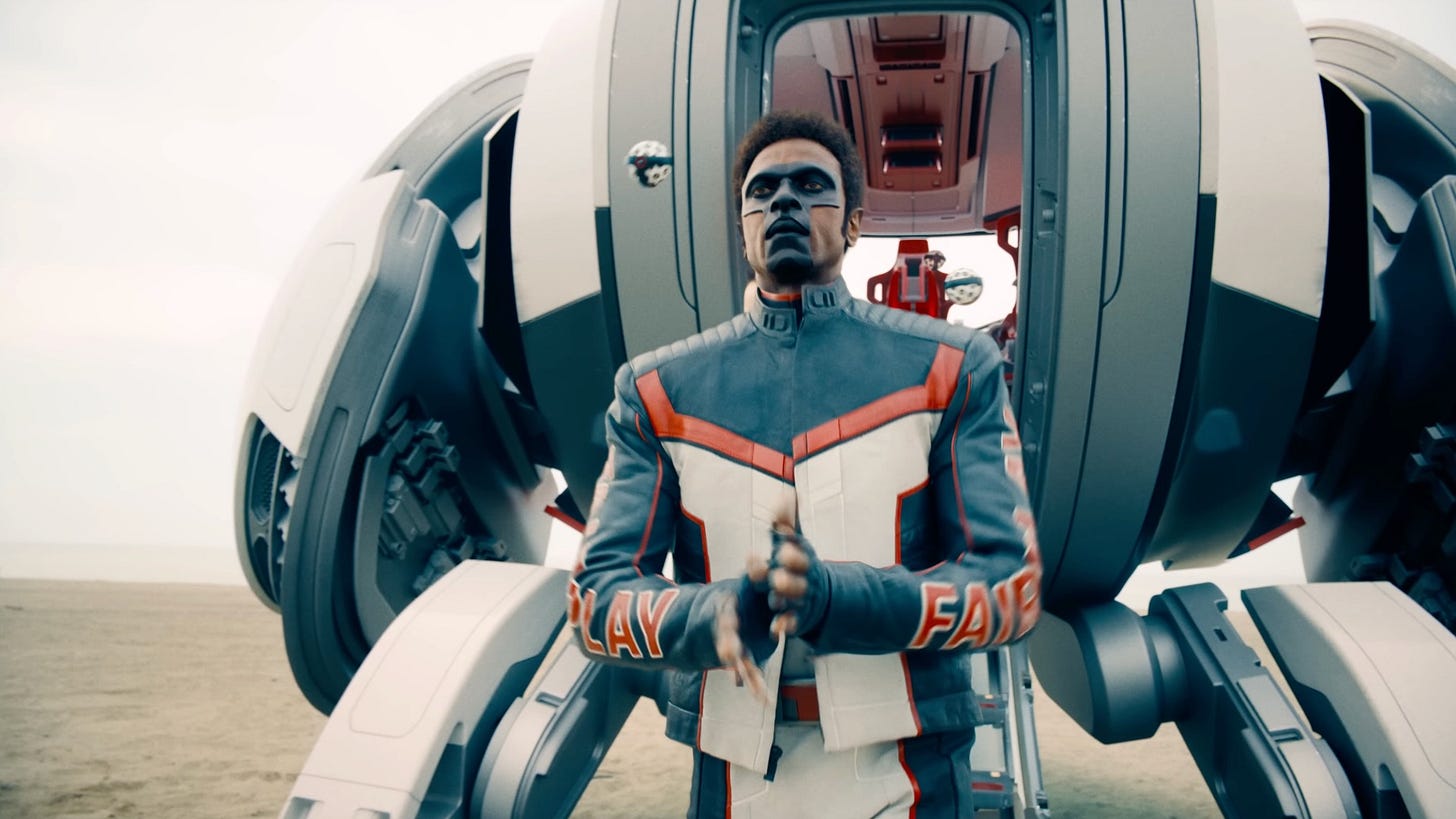Review: James Gunn's "SUPERMAN" is superhero punk rock
Finally, a Superman movie that feels like Superman
To be honest, I was already vibing with James Gunn’s Superman from the moment the first trailer dropped last December; you give me a superpowered dog, let Supes wear the bright red underwear, and revive the John Williams fanfare with an electric guitar, and you’ve already done most of the work. Those good vibes very much continue into the film itself, which starts with all the delirious immediacy of walking into a comic book shop, pulling a random single issue out of a box, and starting to read from there, context be damned. I found myself taken with David Corenswet’s bright-eyed, charismatic, and compellingly vulnerable portrayal of the character; I loved the way this new DC Universe arrives fully formed, overflowing with characters I wanted to follow off into their own individual stories; I felt vindicated by the clear and colorful large-format cinematography, proving my longstanding belief that the taller 1.85:1 aspect ratio is in fact the correct shape for bringing comic-book characters and their worlds to life;1 I was happy to see the increasingly sexless superhero genre kicked back in to gear with Corenswet’s Clark Kent and Rachel Brosnahan’s Lois Lane spending most of their on-screen time together passionately frenching as though their lives depended on it; and of course, I thought Krypto was a very, very good boy.
But the moment I went from ‘vibing’ with this Superman to truly loving what Gunn and company were doing with the character came in a single line of dialogue. Against a neon-drenched backdrop of an extradimensional jellyfish battling over the skies of Metropolis (Supes doesn’t need to worry, the Justice Gang has it covered – this is that kind of comic-book movie), a battered and beleaguered Clark Kent has a heart-to-heart with Lois Lane. They aren’t sure if their relationship is working; maybe they’re just too different to be together. Lois pokes fun at Clark’s taste in music and says she’s “punk rock,” their tastes in music a synecdoche for their reverse inclinations towards cynicism and hope. “I question everything and everyone,”she explains, declaring that Clark, by contrast, trusts everyone he meets. Clark takes a beat, smiles, and says: “Maybe that’s the real punk rock.”
It was never really in doubt that James Gunn would ‘get’ Superman as a character. From Rocket Raccoon to Peacemaker, nobody in the post-MCU era of Hollywood superhero adaptations has shown a deeper or more passionate understanding of comic book heroes and what makes them tick. But the succinctness with which Gunn is able, in this scene and others, to identify what makes Superman special – and why he matters more than ever in 2025 – still took me aback. Over and over again, Gunn’s film proves Clark right, and it does so on two levels: First, in how this film relates to a cinematic landscape where superhero movies (and blockbusters in general) are increasingly colorless, sexless, apolitical, and poisoned by irony. When every other line of dialogue in a Marvel movie is a dead-eyed quip about the stupidity of what we’re watching, a film as unabashedly goofy, over-the-top, and earnest as Gunn’s Superman does indeed feel punk. Second, in the real-world context that greets the film, where Donald Trump is President again, migrants are being demagogued and brutally rounded up, and the world’s richest man spent most of the year taking away food and healthcare from the global south, before returning to his vanity social media platform to tinker with its bespoke AI until it called itself “mechahitler.” When cruelty and vice are the currency of the realm, every individual act of love and virtue is itself a small rebellion. Kindness is punk too.
Some of the film’s imagery probably arrives today more loaded than Gunn initially intended, like a shot of Superman’s face being shoved into the sidewalk by Lex Luthor’s masked secret police, or a private off-the-books prison where migrants, aliens, and Luthor’s personal enemies are stored, all of which have countless front-page analogues in 2025 America that weren’t yet daily reality when the film was being written and produced (similarly, a thread with Superman intervening in a conflict between two fictional countries, one being invaded by the other, probably started life as a Russia/Ukraine analogue, but lands in 2025 feeling more directly connected to Israel’s decimation of Gaza).
Yet I don’t think it’s at all accidental that Gunn’s Superman winds up being the most politically pointed superhero film of the modern era. This is a character meant to stand for something, and when a talented writer makes that ‘something’ tangible – and also, crucially, articulates what that stance opposes – the results will be inevitably and indelibly political. Superman was not conceived in a vacuum, but came on the scene in the 1930s, the brainchild of two Jewish artists in the period preceding the Holocaust. That Superman’s greatest nemesis would be a wealthy industrialist was no accident, when the most famous such figure of Jerry Siegel and Joe Shuster’s day – Henry Ford – was Earth’s most prominent antisemite, such that Hitler had a life-sized portrait of the American automobile magnate behind his desk. Like many superheroes of the WWII period, Superman fought the Nazis abroad; but a year after the war ended, he also dismantled the Ku Klux Klan at home, in the most infamous serial of the Adventures of Superman radio show.
Any incarnation of Superman that fails to evoke the kinds of present-tense evils Superman’s virtue would necessarily oppose is essentially dishonest. Gunn’s take is not perfect – much of the film turns on a revelation Superman learns about his heritage, and while I like what this thread accomplishes thematically, I worry it mixes the immigration metaphors a tad too much for comfort – but it is engaged, deeply and thoughtfully, with the kinds of questions Superman should be engaged with. It paints in broad, pulpy strokes, such that a child could easily understand and connect with the film’s morality, but that’s a feature, not a bug. The magic of American comics never lay in their political nuance, but in their mass accessibility: the kind of escapism that drops us back off in our world understanding and seeing the fault lines a little more clearly, and with a little more hope.
This all redounds to Gunn and Corenswet’s refreshingly grounded take on the title character. And in a world where ‘grounded’ often (and idiotically) means ‘tortured, angst-ridden, and murderous’ (as in WB’s last attempt at reviving the Big Blue Boyscout, Zack Snyder’s Man of Steel), ‘grounded’ here means human. Corenswet is the best to do this since Christopher Reeve, and while his innate charm and movie-star presence is a big part of that, what really distinguishes his work is that Gunn has written an actual character for him to play, one in which we can actively recognize ourselves or others. He laughs, he loves, he gets frustrated, he doubts himself, he rallies. His core conflict is the one Superman should always have: what the hell do you do when having godlike powers isn’t enough to fix the world? This is not a movie about a tortured deity having to learn to live among the rabble; it’s about a guy from Kansas who happens to be superpowered. At a certain point, the entire film feels like a pointed rebuke to the speech from Quentin Tarantino’s Kill Bill where David Carradine argues Clark Kent is actually Superman’s alter-ego, and that Clark’s ‘weakness’ and self-doubt are “Superman’s critique on the whole human race.” Gunn’s Superman pushes back hard against that idea: its central arc is about the hero learning how much he is always Clark Kent, whether he’s aware of it or not, and how that very quotidian, human essence is the real source of his strength. Corenswet only plays a few scenes fully in Clark Kent mode (and only one in the glasses), but despite wearing the red-and-blue costume for most of the runtime, it feels like we see and understand much more of Clark than past Superman movies have offered. At a certain point, Gunn rejects the alter-ego dichotomy altogether; both the film and the character are stronger for it.
In an earlier draft of this review I wrote that Nicholas Hoult imbued Lex Luthor with “pure Saturday-morning-cartoon villain energy,” and I think that’s selling his performance short. Not because there isn’t value or skill in being able to do cartoon evil, but because the more I chew on what Hoult is doing, the more immediate and palpable it feels. Gunn’s script is of course informed by the kinds of evil billionaires that poison the world today – small men who fancy themselves brilliant, but are in fact so insular and insecure that the ability to achieve anything of real substance perpetually outstrips their grasp – and Hoult tears into the sheer ugliness of that archetype with terrifying aplomb. There is a moment late in the film where Lex watches what he thinks will be Superman’s final moments, and the awkward grin that grows across his face is a genuinely startling bit of acting. The glee this man feels in sadism is apparent, but so is the strange, tortured way it comes out and expresses itself, the sense that any emotion that isn’t pure spite comes unnaturally to him. He is getting off on watching a good man die, and realizing how much he likes the power, and yet he doesn’t quite know how to wear that deadly fetishistic pleasure on his body. I thought about the awkward, callous glee Elon Musk displayed when he brandished a chainsaw at CPAC earlier this year, bragging about “feeding USAID into the wood chipper,” an elimination that may lead to more than 14 million excess deaths globally in the next 4 years. That’s the kind of evil Hoult taps into here, the evil of powerful men who cannot feel anything unless it is prompted by almost unimaginable feats of inhumanity. What kind of man would want, more than anything, to destroy a figure as pure and good as Superman? The same kind of man who looks at the Statue of Liberty and sees in it everything they hate about America. These men see the mere existence of hope as their greatest enemy; Lex Luthor has always been their comic-book embodiment, and here, at his most unabashedly wicked and cruel, he feels more real than ever.
Lest it go unsaid amidst the larger thematic conversation, this Superman is a tremendously fun, deliriously entertaining piece of pop culture myth-making. I understand why some are calling it ‘overstuffed,’ as the film does indeed feature a dizzying number of heroes, villains, and guest stars, all of them larger-than-life. But my favorite thing about Gunn’s Superman may in fact be its sprawl. I love how it begins with the world already in progress, fully inhabited as though there were ten other movies we never saw leading up to this one. The film is bursting with characters I’d never heard of before who became personal favorites by the time the end credits roll, with Edi Gathegi in particular stealing the show as Mr. Terrific (when he proudly declares his own name near the film’s climax, I tried to get a wave of applause going in my auditorium – I absolutely adore this guy). Whether it’s the awkward superhero group the ‘Justice Gang’ (which Mr. Terrific is, reluctantly, a part of), the ‘pocket universe’ in which Superman is imprisoned and meets Anthony Carrigan’s Rex Mason (sure to be a crowd-pleasing favorite), the staff at the Daily Planet (where the great Wendell Pierce chomps on a comically oversized cigar for 100% of his screentime), the ‘Superman robots’ at the Fortress of Solitude, or, of course, Krypto the Superdog, every inch of Gunn’s Superman is densely populated. It bodes very well for the new DC Universe Gunn is heading up alongside producer Peter Safran – the film scratches a similar itch for me as the 2013-2024 ‘DC Animated Movies Universe,’ the direct-to-video line that did such a great job creating an interconnected playground for various DC characters to interact – but it also works as a part of this movie, where Superman gets to be part of a world that feels so rich and alive wherever he goes.
There are nits I could pick with this film if I wanted, but they truly pale in comparison to how profoundly Gunn’s Superman embraces parts of this character – and parts of the last century of comic-book storytelling – that Hollywood has been afraid to touch for most of my lifetime. It is goofy, over-the-top, and unabashedly silly in all the ways we come to this material for, and it’s also heartfelt, smart, hopeful, and human in the ways that make us stay. Like Matt Reeves’ 2022 The Batman, this is a DC movie that feels like a massive fresh of breath air to those of us who simply haven’t recognized these characters in most live-action takes on the material. And it feels, in ways superhero movies so rarely do, like a film we truly need right now, not just because it is so fun and entertaining as cinematic escapism, but because it genuinely engages with those aspects of the world that make us want to escape in the first place. It gives us hope by acknowledging the darkness. It shows us a God and then tells us that what makes him special exists in all of us. And if that isn’t the superhero equivalent of punk rock, I don’t know what is.
Read the book 200 Reviews by Jonathan R. Lack in Paperback or on Kindle
Subscribe to PURELY ACADEMIC, our monthly variety podcast about movies, video games, TV, and more
Like anime? Listen to the podcast I host with Sean Chapman, JAPANIMATION STATION, where we review all sorts of anime every week. Watch on YouTube or Subscribe wherever you get your podcasts.
The Marvel approach, of shooting everything for 2.39:1 ‘scope’ but then also doing IMAX releases where they open the matte to 1.90:1 doesn’t count; that’s just exposing extra peripheral imagery that is by definition superfluous. Superman gets it right: the ‘flat’ widescreen shape is the best one to evoke the geometry of comic-book paneling, to showcase superpowers like flight and speed, to make the world feel big and immersive. Especially when you’re dealing with a character like Superman, who lives in a city full of skyscrapers, and who we have always been told to “look up” at, height matters more than width. Thanks for coming to my TED talk.







